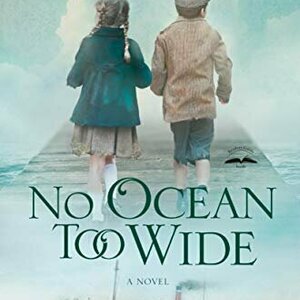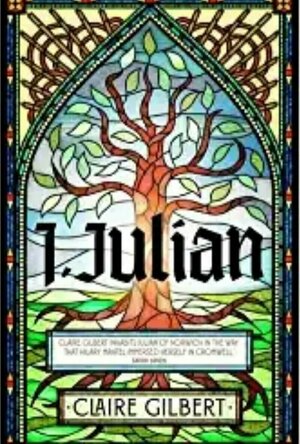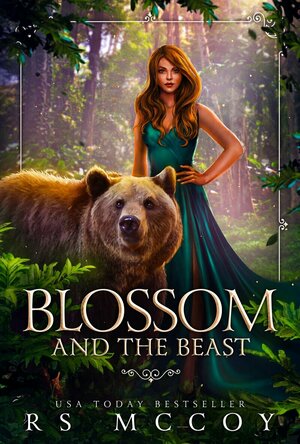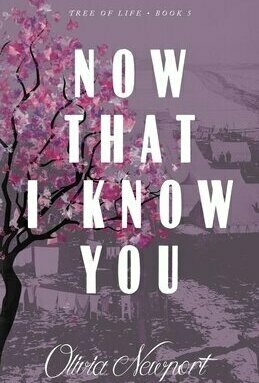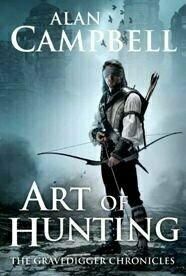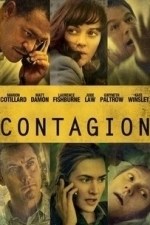Search
MaryAnn (14 KP) rated No Ocean Too Wide (McAlister Family #1) in Books
Nov 4, 2019
Between the years of 1869 to 1939 more than 100,000 poor British children were sent across the ocean to Canada with the promise of a better life. Those who took them in to work as farm laborers or household servants were told they were orphansbut was that the truth?
After the tragic loss of their father, the McAlister family is living at the edge of the poorhouse in London in 1908, leaving their mother to scrape by for her three younger children, while oldest daughter, Laura, works on a large estate more than an hour away. When Edna McAlister falls gravely ill and is hospitalized, twins Katie and Garth and eight-year-old Grace are forced into an orphans home before Laura is notified about her familys unfortunate turn of events in London. With hundreds of British children sent on ships to Canada, whether truly orphans or not, Laura knows she must act quickly. But finding her siblings and taking care of her family may cost her everything.
Andrew Fraser, a wealthy young British lawyer and heir to the estate where Laura is in service, discovers that this common practice of finding new homes for penniless children might not be all that it seems. Together Laura and Andrew form an unlikely partnership. Will they arrive in time? Will their friendship blossom into something more?
Inspired by true events, this moving novel follows Laura as she seeks to reunite her family and her siblings who, in their darkest hours, must cling to the words from Isaiah: Fear thou not; for I am with thee: be not dismayed; for I am thy God
My Thoughts: This was an interesting compelling book to read. It is honestly hard to read about children being taken away from their families by those who feel they are making the children's lives better when in fact the children are treated like slaves. This is the hard part of the book to read, but the fact is, is that this was actually happening during this time period. The author has done a tremendous job of bringing the truth out in this novel. Like every story that has hardship in it, this one does have a little hope. I certainly look forward to reading the second book in this series.
After the tragic loss of their father, the McAlister family is living at the edge of the poorhouse in London in 1908, leaving their mother to scrape by for her three younger children, while oldest daughter, Laura, works on a large estate more than an hour away. When Edna McAlister falls gravely ill and is hospitalized, twins Katie and Garth and eight-year-old Grace are forced into an orphans home before Laura is notified about her familys unfortunate turn of events in London. With hundreds of British children sent on ships to Canada, whether truly orphans or not, Laura knows she must act quickly. But finding her siblings and taking care of her family may cost her everything.
Andrew Fraser, a wealthy young British lawyer and heir to the estate where Laura is in service, discovers that this common practice of finding new homes for penniless children might not be all that it seems. Together Laura and Andrew form an unlikely partnership. Will they arrive in time? Will their friendship blossom into something more?
Inspired by true events, this moving novel follows Laura as she seeks to reunite her family and her siblings who, in their darkest hours, must cling to the words from Isaiah: Fear thou not; for I am with thee: be not dismayed; for I am thy God
My Thoughts: This was an interesting compelling book to read. It is honestly hard to read about children being taken away from their families by those who feel they are making the children's lives better when in fact the children are treated like slaves. This is the hard part of the book to read, but the fact is, is that this was actually happening during this time period. The author has done a tremendous job of bringing the truth out in this novel. Like every story that has hardship in it, this one does have a little hope. I certainly look forward to reading the second book in this series.
156Reviews (7 KP) rated Extra Ordinary (2019) in Movies
May 1, 2020 (Updated May 1, 2020)
Ghosts, hell demons, possessed animals, sex, a car chase, people exploding, ware-wolves (Kind of), Extra Ordinary has it all. Is it some kind of Hollywood blockbuster staring Benedict Cumberbatch? No, it's a small independent Irish comedy staring little known actors, and Will Forte of course.
The film begins by introducing us to Rose Dooley (Maeve Higgins), a very single driving instructor in a small town who has a “Talent”. She can talk to Ghosts. After the death of her father when she was a child, Rose no longer uses these talents though. She spends her days teaching the locals how to drive, and her evenings with no trousers on, eating microwavable meals for one and ignoring messages on her phone from people asking for supernatural help. That is until she gets a call from Martin Martin, who is being haunted by his dead ex-wife, and her journey back to the exorcism business begins.
What this film does best is keep the ordinary and the supernatural events very grounded. Instead of screaming angry spirits howling in the night they see messages like “You must pay ..... The car tax” or “Dog has worms”. The dead don't stick around to terrorise, they are here to make sure we're doing the recycling properly, or donating enough money to charity. Even Christian Winter (Will Forte) the satanist pop-star dubbed “One hit Winter” seems like an every-day man, doing the ironing and making cups of tea between sacrifices and demon summoning.
As the films big-bad, Will Forte does a decent job of keeping the film flowing, even if it is almost identical to his Last man on Earth performance. It's Rose and Martins relationship that really pulls the film forward. After Martins Daughter starts floating in mid-air, he reaches out to Rose for help. Directors Mike Ahern and Enda Loughman succeed in making Rose and Martins journey through the mysterious, humorous yet believable, a will they-won't they without the cheesiness.
Overall this is a very funny, well made film, not afraid to take the time from driving the plot to include some great, if possibly unnecessary scenes, Christian Winter's driving lesson is a particular highlight. Everybody involved has done an excellent job making a great film. It's absurd, it's funny, it's weird, it's well worth a watch.
The film begins by introducing us to Rose Dooley (Maeve Higgins), a very single driving instructor in a small town who has a “Talent”. She can talk to Ghosts. After the death of her father when she was a child, Rose no longer uses these talents though. She spends her days teaching the locals how to drive, and her evenings with no trousers on, eating microwavable meals for one and ignoring messages on her phone from people asking for supernatural help. That is until she gets a call from Martin Martin, who is being haunted by his dead ex-wife, and her journey back to the exorcism business begins.
What this film does best is keep the ordinary and the supernatural events very grounded. Instead of screaming angry spirits howling in the night they see messages like “You must pay ..... The car tax” or “Dog has worms”. The dead don't stick around to terrorise, they are here to make sure we're doing the recycling properly, or donating enough money to charity. Even Christian Winter (Will Forte) the satanist pop-star dubbed “One hit Winter” seems like an every-day man, doing the ironing and making cups of tea between sacrifices and demon summoning.
As the films big-bad, Will Forte does a decent job of keeping the film flowing, even if it is almost identical to his Last man on Earth performance. It's Rose and Martins relationship that really pulls the film forward. After Martins Daughter starts floating in mid-air, he reaches out to Rose for help. Directors Mike Ahern and Enda Loughman succeed in making Rose and Martins journey through the mysterious, humorous yet believable, a will they-won't they without the cheesiness.
Overall this is a very funny, well made film, not afraid to take the time from driving the plot to include some great, if possibly unnecessary scenes, Christian Winter's driving lesson is a particular highlight. Everybody involved has done an excellent job making a great film. It's absurd, it's funny, it's weird, it's well worth a watch.
Emma @ The Movies (1786 KP) rated Tomb Raider (2018) in Movies
Sep 25, 2019
Lara Croft, the fiercely independent daughter of a missing adventurer, must push herself beyond her limits when she finds herself on the island where her father disappeared.
3D screening of this one... yes I never learn! You know what I'm going to say... 3D ain't for me. Again, nothing particularly stood out in this one for me with the effects. There felt like very little point in doing it in 3D apart from gouging some more money out of cinema goers.
Being that this preview was only the day before general release I really wasn't surprised that there were so few people there. I really wish I'd waited for the 2D showing.
Here's where we take a swift turn from where I thought my waffle would go for this one... It's an action film with a strong female character, and a lot of us were sold after the first outing of our tomb raiding totty. This one however felt like I'd just found a treasure chest full of Fool's Gold.
I'm not entirely sure that I liked much in it at all. There seemed to be several bits that were surplus to requirements, and honestly didn't even vaguely add anything to the production. And even if you suspend belief, as you would expect to do in this kind of film, you're still left with several bits that just make you stop and say "no".
You heard me talk above about people leaving the secret screening before even five minutes of the movie were done with... two people left this screening half way through. Admittedly I don't know why, but when you couple that with the fact I've never seen so many people going in and out of the screen during a film... well, I get the feeling everyone was a little bit bored. A lot of what was happening wasn't really engaging enough to hook you in until that "big bad" reveal. If it hadn't been for the fact I knew it would bug people who were sitting up and across the aisle from me, I'd have had my phone out like I was sitting at home on my sofa watching a movie on Movies 24.
I want to say I was extremely disappointed in this, but to be honest it doesn't really make me want to express any feelings that strong about it.
3D screening of this one... yes I never learn! You know what I'm going to say... 3D ain't for me. Again, nothing particularly stood out in this one for me with the effects. There felt like very little point in doing it in 3D apart from gouging some more money out of cinema goers.
Being that this preview was only the day before general release I really wasn't surprised that there were so few people there. I really wish I'd waited for the 2D showing.
Here's where we take a swift turn from where I thought my waffle would go for this one... It's an action film with a strong female character, and a lot of us were sold after the first outing of our tomb raiding totty. This one however felt like I'd just found a treasure chest full of Fool's Gold.
I'm not entirely sure that I liked much in it at all. There seemed to be several bits that were surplus to requirements, and honestly didn't even vaguely add anything to the production. And even if you suspend belief, as you would expect to do in this kind of film, you're still left with several bits that just make you stop and say "no".
You heard me talk above about people leaving the secret screening before even five minutes of the movie were done with... two people left this screening half way through. Admittedly I don't know why, but when you couple that with the fact I've never seen so many people going in and out of the screen during a film... well, I get the feeling everyone was a little bit bored. A lot of what was happening wasn't really engaging enough to hook you in until that "big bad" reveal. If it hadn't been for the fact I knew it would bug people who were sitting up and across the aisle from me, I'd have had my phone out like I was sitting at home on my sofa watching a movie on Movies 24.
I want to say I was extremely disappointed in this, but to be honest it doesn't really make me want to express any feelings that strong about it.

Hakuoki: Premium Edition
Games
App
Hakuoki: Premium Edition “Hakuoki”, the otome game that gained popularity not only in Japan but...
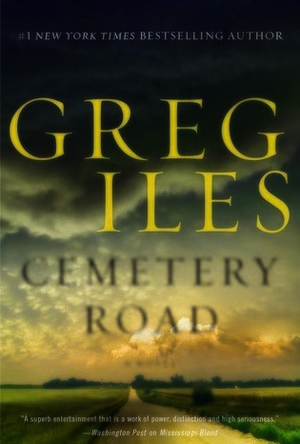
Cemetery Road
Book
The #1 New York Times bestselling author of the Natchez Burning trilogy returns with an electrifying...
The concept of an anchorite, or in this case an anchoress, has fascinated me ever since I googled the term when my dad sent me a CD by someone called The Anchoress (she’s very good, by the way!). So when this book popped up on NetGalley, I was all in. And to be fair, the front cover would pretty much mean an insta-buy for me (it is gorgeous).
This novel imagines, what the autobiography of Julian of Norwich would be like. Julian was born in the mid-1300s, and after some serious losses during periods of pestilence - her father and then husband and daughter - she decides that she doesn’t want to remarry.
When she becomes very I’ll and almost dies, Julian experiences visions of God, and decides that she will devote her life to prayer. When a position as an anchorite in Norwich Cathedral becomes available, Julian Starts to prepare.
I found this an absolutely fascinating read. Basically, as an anchorite, you become dead to the world. You go to your own funeral wearing a shroud, and then you’re taken into a room where the door is bricked up. Your only contact with the world is through two small windows: one is for contact with a servant (you need to be able to afford one - they feed and clothe you, and pass cleaning materials as well through hole), the other opens on to the altar in the church. You pray, you listen to penitents or people wanting to confess, and your speak to your confessor (how on earth would you be able to sin?!). And then you pray more.
Ok, I admit that this review may not sell the book (I hope it does!) to its best advantage, but I really did find it fascinating! The fact that Julian’s faith was so strong that she could lock herself away from the world entirely was so alien to me. To be honest, I would imagine that devoting yourself to the cloistered life as a nun might be more favourable to dying young in childbirth as so many women did then. However, I very much doubt that the life of an anchorite was easy!
This is a thoroughly believable, well-written book. One to be savoured. I loved it.
This novel imagines, what the autobiography of Julian of Norwich would be like. Julian was born in the mid-1300s, and after some serious losses during periods of pestilence - her father and then husband and daughter - she decides that she doesn’t want to remarry.
When she becomes very I’ll and almost dies, Julian experiences visions of God, and decides that she will devote her life to prayer. When a position as an anchorite in Norwich Cathedral becomes available, Julian Starts to prepare.
I found this an absolutely fascinating read. Basically, as an anchorite, you become dead to the world. You go to your own funeral wearing a shroud, and then you’re taken into a room where the door is bricked up. Your only contact with the world is through two small windows: one is for contact with a servant (you need to be able to afford one - they feed and clothe you, and pass cleaning materials as well through hole), the other opens on to the altar in the church. You pray, you listen to penitents or people wanting to confess, and your speak to your confessor (how on earth would you be able to sin?!). And then you pray more.
Ok, I admit that this review may not sell the book (I hope it does!) to its best advantage, but I really did find it fascinating! The fact that Julian’s faith was so strong that she could lock herself away from the world entirely was so alien to me. To be honest, I would imagine that devoting yourself to the cloistered life as a nun might be more favourable to dying young in childbirth as so many women did then. However, I very much doubt that the life of an anchorite was easy!
This is a thoroughly believable, well-written book. One to be savoured. I loved it.
Merissa (13611 KP) rated Blossom and the Beast (The Alder Tales #1) in Books
Jun 8, 2023
Okay, so this book is a Fairy Tale Retelling of Beauty and the Beast. With that in mind, I thought I had a fairly good idea of what to expect. Boy, was I wrong!
In Blossom and the Beast, Blossom is the youngest daughter of a clan chief. Her father has a fox for a totem animal, her three brothers are bears(!), and it is suspected that Blossom will be the same. She has a very inquisitive mind and struggles against the rules and traditions that bind her under the canopy. On a trip out of camp (when she shouldn't have been) she is spotted by Kaide. He immediately wants her in his life and does whatever it takes to ensure it. He is determined to win her over though, so he treats her with every respect.
With political manoeuvrings galore, plus a sweet and sensual romance, this book is more than just a Fairy Tale Retelling! This is an amazing book in its own right, and should definitely be recognised as such. Amazing story, with well-rounded and believable characters, this story will entice and enthral.
I will say one thing about the ending without giving out any spoilers - BE CAREFUL!!! When I finished the ending, my Kindle nearly went for a burton! It was so close to hitting the wall as I stomped around my home in disbelief. Without giving too many details, I sort of knew how it was going to end, without knowing the specific details. When those details came to life, I screeched as I couldn't believe it. It was a train wreck that I could see happening, without any means of stopping it! I was actually complaining to Blossom (my Kindle) about her actions and what she should have done instead - much to the amusement of my husband may I just add!
With no editing or grammatical errors that I found, this story certainly deserves its 5-star rating. Absolutely fantastic and I really, REALLY, can't wait for the second book to see where it will go.
* A copy of this book was provided to me with no requirements for a review. I voluntarily read this book, and the comments here are my honest opinion. *
Merissa
Archaeolibrarian - I Dig Good Books!
May 31, 2016
In Blossom and the Beast, Blossom is the youngest daughter of a clan chief. Her father has a fox for a totem animal, her three brothers are bears(!), and it is suspected that Blossom will be the same. She has a very inquisitive mind and struggles against the rules and traditions that bind her under the canopy. On a trip out of camp (when she shouldn't have been) she is spotted by Kaide. He immediately wants her in his life and does whatever it takes to ensure it. He is determined to win her over though, so he treats her with every respect.
With political manoeuvrings galore, plus a sweet and sensual romance, this book is more than just a Fairy Tale Retelling! This is an amazing book in its own right, and should definitely be recognised as such. Amazing story, with well-rounded and believable characters, this story will entice and enthral.
I will say one thing about the ending without giving out any spoilers - BE CAREFUL!!! When I finished the ending, my Kindle nearly went for a burton! It was so close to hitting the wall as I stomped around my home in disbelief. Without giving too many details, I sort of knew how it was going to end, without knowing the specific details. When those details came to life, I screeched as I couldn't believe it. It was a train wreck that I could see happening, without any means of stopping it! I was actually complaining to Blossom (my Kindle) about her actions and what she should have done instead - much to the amusement of my husband may I just add!
With no editing or grammatical errors that I found, this story certainly deserves its 5-star rating. Absolutely fantastic and I really, REALLY, can't wait for the second book to see where it will go.
* A copy of this book was provided to me with no requirements for a review. I voluntarily read this book, and the comments here are my honest opinion. *
Merissa
Archaeolibrarian - I Dig Good Books!
May 31, 2016
Lindsay (1779 KP) rated Now That I Know You (Tree of Life #5) in Books
Mar 13, 2025
We have been reintroduced to Jillian and Nolan. Her father and I were introduced to her so-called fourth cousin, Cate Buttler, on her mother's side. We also know Drew is mentioned, who seems to be now dating Jillian.
How will Jillian feel about this new cousin from the Perisi family? Who is Cate Buttler, and is she related to Jillian Duffy? Cate seems to persist in Jillian helping her and understanding her, but she comes unannounced. Can Jillian help her?
The plot gets ticker as we get started. The book takes time to travel back to 1913, in Pueblo, Colorado, to begin the family history story. The book does go back to the present again. We will get this throughout, and it is interesting. We meet Carrick and Ela.
We are introduced to a few more characters in 1913. They are Caterina, her husband Geppetto, and her son Giuseppe (Peppy). We also got the name Salvatore as an uncle's name. We jump to September 19, 1913, and learn about Parisi's family history through the eyes of Caterina. When she reads about the strike, she starts to worry about her friend Chiara, who is sick with a child. Chiara's husband is a miner who works for a mining company. Will she bring her friend Chiara and her husband home to stay?
We also learn that Parisi worked for Carrick and Ela Kyps, the ranch owners, in 1913. But will they survive and bring home their friends? Caterina seems to Ela that she does not like the coming strike. They offer or ask her to go and get her friend Chiara. Will they find and bring them home?
Jillian is getting ready to head south to meet up with her Cate Butler, who says she is a cousin and asks what career Cate has and why she might or is asking for Jillian's help. Nolan is still home when she comes down to eat. Jillian wants to know if her dad won't be coming. He has to deal with Court and meetings. However, Drew will be meeting her. Nolan seems to be getting calls that he does not want his daughter to overhear. Jillian still wished he was coming with her. What is this call about, or about his court meeting in Denver? Will Jillian get clues about Cate Butler or any other clues about her mother's side of the family history?
How will Jillian feel about this new cousin from the Perisi family? Who is Cate Buttler, and is she related to Jillian Duffy? Cate seems to persist in Jillian helping her and understanding her, but she comes unannounced. Can Jillian help her?
The plot gets ticker as we get started. The book takes time to travel back to 1913, in Pueblo, Colorado, to begin the family history story. The book does go back to the present again. We will get this throughout, and it is interesting. We meet Carrick and Ela.
We are introduced to a few more characters in 1913. They are Caterina, her husband Geppetto, and her son Giuseppe (Peppy). We also got the name Salvatore as an uncle's name. We jump to September 19, 1913, and learn about Parisi's family history through the eyes of Caterina. When she reads about the strike, she starts to worry about her friend Chiara, who is sick with a child. Chiara's husband is a miner who works for a mining company. Will she bring her friend Chiara and her husband home to stay?
We also learn that Parisi worked for Carrick and Ela Kyps, the ranch owners, in 1913. But will they survive and bring home their friends? Caterina seems to Ela that she does not like the coming strike. They offer or ask her to go and get her friend Chiara. Will they find and bring them home?
Jillian is getting ready to head south to meet up with her Cate Butler, who says she is a cousin and asks what career Cate has and why she might or is asking for Jillian's help. Nolan is still home when she comes down to eat. Jillian wants to know if her dad won't be coming. He has to deal with Court and meetings. However, Drew will be meeting her. Nolan seems to be getting calls that he does not want his daughter to overhear. Jillian still wished he was coming with her. What is this call about, or about his court meeting in Denver? Will Jillian get clues about Cate Butler or any other clues about her mother's side of the family history?
Phil Leader (619 KP) rated Art of Hunting (The Gravedigger Chronicles #2) in Books
Nov 8, 2019
I read the first installment of the Gravedigger Chronicles, Sea Of Ghosts a little while ago and the sheer imagination really grabbed my attention. While waiting for the second book I read Campbell's first trilogy and this confirmed a grasp for creating very different, if very dark, fantasy worlds.
The first book follows the story of Thomas Granger, ex-Colonel with the elite 'Gravediggers' army unit now the owner and warden of a decrepit prison in a world that is literally drowning. Humans share the world with the intelligent and long-lived Unmer, for centuries their slaves until a band of telepaths overthrew them. In revenge the Unmer seeded the sees with thousands of small bottles - icusae - which are constantly producing poisonous 'brine', making the seas toxic and raising the sea level.
Granger sets off on a quest to find is estranged daughter Ianthe - herself an incredibly powerful but blind telepath - and so we see this strange and often brutal world, meeting Briana Marks the arrogant head of the telepaths and Ethan Maskeleyne, metaphysicist and hunter of Unmer treasure.
The book ends cataclysmically with Ianthe all but destroying the telepaths' power with her mind and setting the trapped Unmer prince Marquetta free at the same time as her father - now with magical armour and sword - arrives to rescue her himself.
The second book carried straight on from the first, detailing the aftermath of the battle and the Unmer's plans to once again rule, beginning with Marquetta's plan to marry Ianthe. Granger is naturally suspicious of his motives towards his only daughter. Marquetta also needs to eliminate another Unmer lord, Conquillas, who has been hired as an assassin by Briana Marks to kill Marquetta and his uncle. Conquillas is an Unmer rebel who has studied war and hunting until it is an art form to him. Marquetta plans to eliminate him by challenging him to a tournament which is rigged so that Conquillas cannot survive.
Learning of the plans, Granger decides to leave his daughter and travel to find Conquillas and warn him. But soon he has more to worry about as his Unmer sword literally has a mind of its own. Meanwhile Maskeleyne is on his own quest to discover why the unfortunate people who have 'drowned' in the brine seas (but still have a sort of life) are bringing him keys.
As can be seen from the brief description above this is a complex book. Although the story is told from four viewpoints - Granger, Ianthe, Maskeleyne and Briana Marks - the bulk of the story is carried by Granger (on his own quest) and Ianthe (following with the Unmer). Granger is a terrific character - he is gruff and insentimental and is not always a sympathetic character. But he is also very driven and always sees the solution to anything as a straight line, regardless of any obstacles on that path he will just bulldoze straight through them. Ianthe is more subtle as a character because she is essentially tagging along with Marquetta and apart from the marriage plot doesn't really contribute very much.
The world they inhabit is excellent. This is a different kind of fantasy world. Rather than being stuck in medieval worlds as tends to be the case, there is a lot of technology. There are guns and gas cutting torches for example. Everything seems to be very very old and anything enchanted by the Unmer is as dangerous to the innocent wielder as their target.
After the first book it is interesting to see more of the Unmer in action. Marquetta is a proud and determined prince, his uncle fills the role of scheming manipulator well and it is not clear if Marquetta follows his uncle or is merely another pawn in the play. Conquillas is also well drawn for the few scenes he is in, the consumate warrior and hunter while still being otherworldly and cold towards the humans that he deals with. Maskeleyne also comes to the fore in this book after being something of a villain in the first book in this book he is not at odds with the other main characters and so is a much more rounded person rather than a cipher to explain Unmer artifacts and move the plot along.
Yes this is a hard read; the chapters are long (there are only 8 chapters in the book) which means it is a long time between breaks in the narrative and the start does take a long long time to get going although a lot of the information is vital in setting up the rest of the book. Once it gets going however it flows well. In fact I would say the tournament at the end was a little rushed - some more insight into the early rounds would have been interesting I think - but as the main point is to get the final showdown this can be excused.
Overall, a fantastic second part and I eagerly look forward the the third installment.
Rating: Some slight swearing and crude references
The first book follows the story of Thomas Granger, ex-Colonel with the elite 'Gravediggers' army unit now the owner and warden of a decrepit prison in a world that is literally drowning. Humans share the world with the intelligent and long-lived Unmer, for centuries their slaves until a band of telepaths overthrew them. In revenge the Unmer seeded the sees with thousands of small bottles - icusae - which are constantly producing poisonous 'brine', making the seas toxic and raising the sea level.
Granger sets off on a quest to find is estranged daughter Ianthe - herself an incredibly powerful but blind telepath - and so we see this strange and often brutal world, meeting Briana Marks the arrogant head of the telepaths and Ethan Maskeleyne, metaphysicist and hunter of Unmer treasure.
The book ends cataclysmically with Ianthe all but destroying the telepaths' power with her mind and setting the trapped Unmer prince Marquetta free at the same time as her father - now with magical armour and sword - arrives to rescue her himself.
The second book carried straight on from the first, detailing the aftermath of the battle and the Unmer's plans to once again rule, beginning with Marquetta's plan to marry Ianthe. Granger is naturally suspicious of his motives towards his only daughter. Marquetta also needs to eliminate another Unmer lord, Conquillas, who has been hired as an assassin by Briana Marks to kill Marquetta and his uncle. Conquillas is an Unmer rebel who has studied war and hunting until it is an art form to him. Marquetta plans to eliminate him by challenging him to a tournament which is rigged so that Conquillas cannot survive.
Learning of the plans, Granger decides to leave his daughter and travel to find Conquillas and warn him. But soon he has more to worry about as his Unmer sword literally has a mind of its own. Meanwhile Maskeleyne is on his own quest to discover why the unfortunate people who have 'drowned' in the brine seas (but still have a sort of life) are bringing him keys.
As can be seen from the brief description above this is a complex book. Although the story is told from four viewpoints - Granger, Ianthe, Maskeleyne and Briana Marks - the bulk of the story is carried by Granger (on his own quest) and Ianthe (following with the Unmer). Granger is a terrific character - he is gruff and insentimental and is not always a sympathetic character. But he is also very driven and always sees the solution to anything as a straight line, regardless of any obstacles on that path he will just bulldoze straight through them. Ianthe is more subtle as a character because she is essentially tagging along with Marquetta and apart from the marriage plot doesn't really contribute very much.
The world they inhabit is excellent. This is a different kind of fantasy world. Rather than being stuck in medieval worlds as tends to be the case, there is a lot of technology. There are guns and gas cutting torches for example. Everything seems to be very very old and anything enchanted by the Unmer is as dangerous to the innocent wielder as their target.
After the first book it is interesting to see more of the Unmer in action. Marquetta is a proud and determined prince, his uncle fills the role of scheming manipulator well and it is not clear if Marquetta follows his uncle or is merely another pawn in the play. Conquillas is also well drawn for the few scenes he is in, the consumate warrior and hunter while still being otherworldly and cold towards the humans that he deals with. Maskeleyne also comes to the fore in this book after being something of a villain in the first book in this book he is not at odds with the other main characters and so is a much more rounded person rather than a cipher to explain Unmer artifacts and move the plot along.
Yes this is a hard read; the chapters are long (there are only 8 chapters in the book) which means it is a long time between breaks in the narrative and the start does take a long long time to get going although a lot of the information is vital in setting up the rest of the book. Once it gets going however it flows well. In fact I would say the tournament at the end was a little rushed - some more insight into the early rounds would have been interesting I think - but as the main point is to get the final showdown this can be excused.
Overall, a fantastic second part and I eagerly look forward the the third installment.
Rating: Some slight swearing and crude references
Movie Metropolis (309 KP) rated Contagion (2011) in Movies
Jun 11, 2019
Steven Soderbergh has produced some fine films in his time as an established director; Ocean’s Eleven was a sublime mix of dark humour and action, whilst Ocean’s Twelve and Thirteen remained decent but not exactly pulse-racing. Here, it seems Soderbergh sticks to what he knows best, how to deliver a brilliantly shot, gripping film. Here we have, Contagion.
An all-star cast with the likes of Gwyneth Paltrow, Kate Winslet, Matt Damon and Jude Law is bolstered by excellent cinematography and nail-biting claustrophobia in a film which never forgets its purpose: to shock.
Contagion starts with a cough, a single cough from a single woman, which in turn spreads across the globe, killing over 20 million people in every country on the planet and becoming one of the worst viral epidemics the world has ever seen. The directing style is exquisite and focuses on the days after the first contraction of the deadly virus; close-ups of door knobs and drinking fountains add to the heightened panic and sense of claustrophobia and the continuous references to bird-flu bring it home how frail a race we actually are.
Soderbergh gets stuck into the details of the virus straight away and the pace never lets up, you’ll be gasping for air with the infected as you struggle to keep pace with what’s going on; it’s a relentless film, much like the disease itself. The movie is one of many recent developments that have parallel storylines running throughout; Kate Winslet is a scientist at the centre of disease research, whilst Matt Damon plays a middle aged father protecting his daughter.
Gwyneth Paltrow plays a wife and mother who has been embarking on a dangerous affair whilst away on business and it has to be said, she is excellent in her role, even though it lasts a mere 20 minutes before she pegs it. Her illness is well controlled on screen and you share the pain she is in.
Matt Damon is somehow immune to the virus after losing his wife (Paltrow) and more disturbingly, his son in scenes unbefitting of the films 12A certificate and Kate Winslet looks surprisingly angelic in her body bag… oops, didn’t mean to spoil that for you.
Alas, it’s not all good news as Jude Law pops up now and again as an annoying journalist trying to discover a cure and shame the money grabbing pharmaceutical companies, he plays the character well and you definitely buy into his sense of ‘crazy’ but out of all the stories shuffling for your attention, his is the one you care least about.
Unfortunately, some other small issues hold the film from being a complete success. Parallel storylines are all well and good but there are perhaps too many here. Whilst focusing on Winslet dealing with the fact she has contracted the virus, you forget about how Mr. Damon is coping looking after his potentially not immune daughter and the same can be said for Law’s character too. Which one are we to focus on?
Contagion is artistically, a brilliant film, but it could be said that it’s more style over substance. Yes, the characters have depth, though not as much as we’d like, the story is well written and the shots are beautifully choreographed but that good, solid story is lost about half way through as Soderbergh tries to handle all the different viewpoints. It’s a fantastic film, but not the outright success it could have been. You will however, be reaching for that anti-bacterial hand cleanser a little more often.
https://moviemetropolis.net/2011/11/08/review-contagion-2011/
An all-star cast with the likes of Gwyneth Paltrow, Kate Winslet, Matt Damon and Jude Law is bolstered by excellent cinematography and nail-biting claustrophobia in a film which never forgets its purpose: to shock.
Contagion starts with a cough, a single cough from a single woman, which in turn spreads across the globe, killing over 20 million people in every country on the planet and becoming one of the worst viral epidemics the world has ever seen. The directing style is exquisite and focuses on the days after the first contraction of the deadly virus; close-ups of door knobs and drinking fountains add to the heightened panic and sense of claustrophobia and the continuous references to bird-flu bring it home how frail a race we actually are.
Soderbergh gets stuck into the details of the virus straight away and the pace never lets up, you’ll be gasping for air with the infected as you struggle to keep pace with what’s going on; it’s a relentless film, much like the disease itself. The movie is one of many recent developments that have parallel storylines running throughout; Kate Winslet is a scientist at the centre of disease research, whilst Matt Damon plays a middle aged father protecting his daughter.
Gwyneth Paltrow plays a wife and mother who has been embarking on a dangerous affair whilst away on business and it has to be said, she is excellent in her role, even though it lasts a mere 20 minutes before she pegs it. Her illness is well controlled on screen and you share the pain she is in.
Matt Damon is somehow immune to the virus after losing his wife (Paltrow) and more disturbingly, his son in scenes unbefitting of the films 12A certificate and Kate Winslet looks surprisingly angelic in her body bag… oops, didn’t mean to spoil that for you.
Alas, it’s not all good news as Jude Law pops up now and again as an annoying journalist trying to discover a cure and shame the money grabbing pharmaceutical companies, he plays the character well and you definitely buy into his sense of ‘crazy’ but out of all the stories shuffling for your attention, his is the one you care least about.
Unfortunately, some other small issues hold the film from being a complete success. Parallel storylines are all well and good but there are perhaps too many here. Whilst focusing on Winslet dealing with the fact she has contracted the virus, you forget about how Mr. Damon is coping looking after his potentially not immune daughter and the same can be said for Law’s character too. Which one are we to focus on?
Contagion is artistically, a brilliant film, but it could be said that it’s more style over substance. Yes, the characters have depth, though not as much as we’d like, the story is well written and the shots are beautifully choreographed but that good, solid story is lost about half way through as Soderbergh tries to handle all the different viewpoints. It’s a fantastic film, but not the outright success it could have been. You will however, be reaching for that anti-bacterial hand cleanser a little more often.
https://moviemetropolis.net/2011/11/08/review-contagion-2011/
